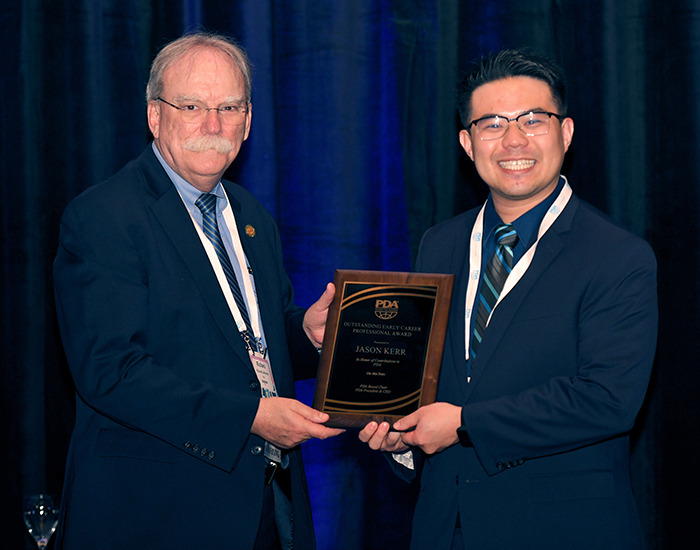Keck Graduate Institute alumnus Jason Kerr, MBS ’16, recently earned the Outstanding Early Career Professional (ECP) Award from the nonprofit Parenteral Drug Association (PDA), the leading global provider of science, technology, and regulatory information and education for the pharmaceutical community. The award recognizes Kerr’s many contributions to the PDA, starting as a member of the Southern California Student Chapter.
He currently serves as Treasurer of the Southern California Chapter, is a member of the PDA Membership Advisory Committee, the PDA Letter Editorial Committee, and was co-chair of the 2022 Annual Meeting (the first-ever ECP co-chair for a PDA conference), having served on the committee since 2018.
In addition to his contributions to the PDA, Kerr’s career to date—spanning more than six years in quality and regulatory affairs—represents a commitment to providing pharmaceutical and biotech companies with scientifically-sound information that enables the companies to make the best decisions regarding safety and quality. In the fast-changing world of medicine—which is changing rapidly due to technological innovations—access to such information is critical and lifesaving.
Starting as a graduate intern in 2015, Kerr worked at Gilead Sciences in Regulatory Affairs: Chemistry, Manufacturing, and Controls. Kerr’s responsibilities included preparing regulated documentation such as the Food and Drug Administration (FDA)’s certificate of pharmaceutical products for regulatory submissions for approval.
In 2016, Kerr worked as a Material Qualification Engineer for Shire, where he created technical validation risk assessments, protocols, and reports for more than 300 materials for material qualification efforts. He also helped author regulatory submission modules to ensure product approvals.
After two years, Kerr pivoted to a new role as an External Affairs Quality Specialist for Amgen—where he worked for nearly three years collaborating with relevant stakeholders to ensure they remained compliant with the changing global regulations.
Kerr emphasizes that his role is to alert and inform the dynamic changes in regulations and provide companies with the information and training needed to comply.
“When new regulations or guidelines are published, we bring the intelligence back to the company and approach the situation in a risk-based approach,” Kerr said. “We take a global perspective of the intelligence and collaborate with all relevant stakeholders to ensure that the patient’s safety and the product’s quality is uncompromised.”
Specifically, at Amgen, Kerr restructured the Operations Intelligence Program, a business process that captures new regulatory intelligence, triages the intelligence to relevant stakeholders, and connects with subject matter experts to ensure that change controls are completed from start to start finish. This program provides real-time insights that enable company leaders to remain apprised of regulatory compliance’s changing nature and make more informed decisions.
GxP refers to the various “good practice” regulations and guidelines that apply to multiple industries, including the pharmaceutical and food industries. This includes Good Manufacturing Practices—where uniform facilities, equipment, methods, personnel, and requirements are adhered to ensure a controlled environment for the manufacturing, processing, and packaging of a quality drug product—and Good Clinical Practices, which provide the integrity of clinical data for regulatory submission and that a human subject’s safety, rights, and well-being are protected.
As a Senior GxP Specialist for Redica Systems, Kerr has helped strategize and launch new software tools that enable quality and regulatory professionals to manage data and interpret regulatory insights intuitively.
“Previously, if we wanted to review regulatory compliance and the company’s current standard operating procedure (SOP) of a specific drug product, one person would have to comb through thousands of internal SOPs and potentially hundreds of regulatory-dense publications on the topic,” Kerr said. “Now, with Redica Systems’ platform, we can greatly expedite that process using artificial intelligence, enabling us to quickly filter the relevant information to augment the work for the experts. The experts can focus their time on the analysis rather than hunting for the information.”
To this effect, he has established a team to review regulatory agencies’ compliance data and scrape over millions of regulatory data points that aid in analyzing trends in the biopharmaceutical and medical devices industries. Additionally, he has developed a process to monitor regulatory intelligence and capture its changes, helping quality and regulatory professionals to stay up to date in the dynamic regulatory landscape.
In KGI’s Master of Business and Science (MBS) program—where he concentrated in Clinical and Regulatory Affairs—Kerr developed skills in regulations, quality control, quality assurance, and clinical trial designs. Still, he also gained valuable experience in teamwork. Nearly all of his classes involved a group project.
“There are many times we did not get to choose our class project’s teammates, and thus we had to work with individuals that we may not necessarily be compatible with,” Kerr said. “This was extremely valuable in that it mirrored real life.”
“You do not always get to choose the people you work with, but you must learn how to get along with everyone—even when it is challenging—and use communication skills to overcome your differences.”
Kerr also appreciated his courses with Dr. Angelika Niemz, Chair of Business and Bioengineering for the Henry E. Riggs School of Applied Life Sciences and Arnold and Mabel Beckman Professor.
“Her class was challenging, but I learned valuable concepts about the industry that have remained with me today,” Kerr said.
Additionally, he found Dr. Steven Casper, Henry E. Riggs Professor of Management, to significantly influence science, business, and technology. Serving as a graduate student researcher for Casper, Kerr analyzed the classification of university professors in relation to commercialization with industry through patent analysis. He also created a Python script and Excel macro coding to facilitate patent extraction from universities that can analyze keyword filtering.
“Jason is an outstanding graduate of the MBS program who has thrived as a regulatory affairs professional,” Casper said. “I appreciate Jason’s generosity in staying in touch with KGI. He has regularly helped with our local PDA branch, has given guest talks on campus, and has helped many KGI students with career advice.”
